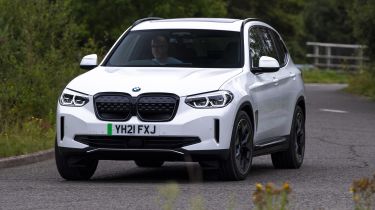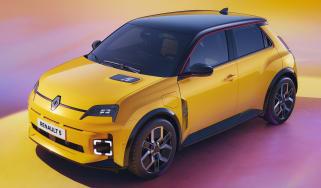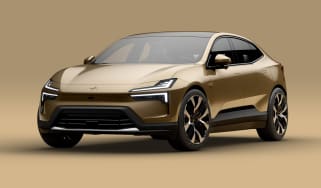Hyundai Ioniq 5 vs BMW iX3 vs Volvo XC40 Recharge: performance and handling
While the dual-motor setup in the XC40 offers stunning performance, and the Ioniq 5’s ride is the most comfortable, the iX3 stands out as the most engaging of the three to drive

When it comes to performance, neither the BMW nor the Hyundai come close to the straight-line speed of the Volvo. Its dual-motor setup pumps out 402bhp and 660Nm of torque, which means this compact family SUV gets all-wheel-drive and can accelerate from 0-62mph in just 4.9 seconds.
The Ioniq 5 is also available in all-wheel-drive form, although here we have the single-motor car, which sends all of its 215bhp and 350Nm to the rear wheels; 0-62mph takes 7.5 seconds. The iX3 on the other hand is only available with rear-wheel-drive, but benefits from the German brand’s fifth-generation electrical drive system, producing 282bhp and 400Nm; enough to cover off 0-62mph in 6.8 seconds.
Each car offers what most would consider plenty of poke for a family SUV – even an electric one – but the Volvo stands out from its rivals in this area with stunning performance. A single-motor version of the XC40 Recharge is now available, though; this is less potent and a closer match to the iX3 and 73kWh rear-drive version of the Ioniq 5 tested here.
The XC40’s extremely light steering is great when driving around town, while wind and road noise are pleasingly muted inside and the driving position is the most SUV-like, with a high-set seat that gives you a commanding view of the road. Large C-pillars hamper visibility over the shoulder, however, and the steering doesn’t inspire confidence on a twisty road. Through corners, the Volvo feels lethargic and a little more top-heavy than the other two.
The Ioniq 5 lacks the startling performance of the Volvo in rear-drive form, but quick throttle response and linear power delivery make it feel more than lively enough when you want. When cornering, the Hyundai’s springs can bounce a little without properly settling, but precise steering means it's always predictable.
The rest of the time, the soft suspension makes for a smooth and relaxing ride, especially on the 19-inch alloy wheels of our test car – the 20-inch rims on previous examples we've driven resulted in a more fidgety ride at times. Plus, behind the Hyundai’s steering wheel are paddles for adjusting the regenerative braking system, which is far more convenient than making adjustments in the Volvo, where the settings are buried in a sub-menu on the touchscreen.
However, the BMW iX3 is by far and away the most engaging of this trio to drive. Simply turn into any corner and it reveals a level of composure lacking in both rivals, plus the body lean of this over two-tonne SUV is well contained. The weighting of all the controls feels just right, and although the steering doesn’t offer a huge amount of feedback, it’s more precise than the setups in the Hyundai and Volvo.
The BMW's powertrain is very slick, too. Throttle response is smooth when crawling in traffic, but there's instant performance when you need to accelerate, at which point the car feels even quicker than its claimed 0-62mph time suggests. The iX3’s regenerative braking system is also a highlight, as it allows you to do most of your driving using one pedal. It’s not as strong as the setup in BMW’s own i3 supermini, but it's still strong enough to make a discernible difference to the battery’s state of charge around town.
The iX3 achieves all of this while feeling relaxing and refined, and as a result is well suited to the role of motorway cruiser. The ride is firmer than the Ioniq 5’s by some margin, but it’s never uncomfortable thanks to the well set-up adaptive damping.



